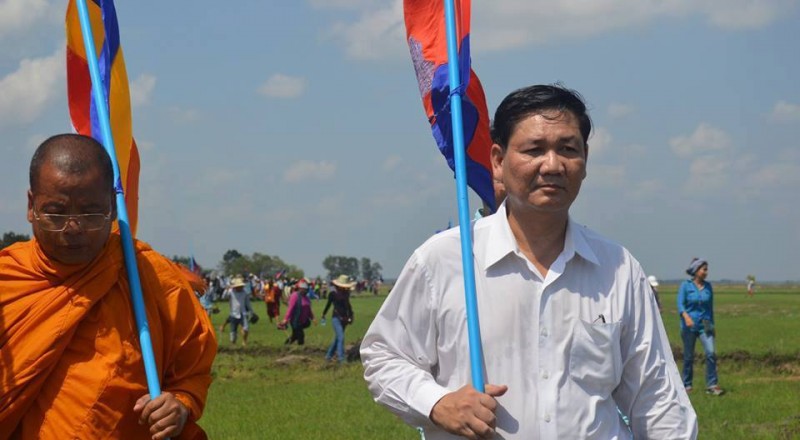ចិនស្ទង់អនុភាពរបស់ខ្លួនជាមួយនឹងប្រទេសជិតខាងចំពោះការផ្ទុះឡើងនៃជំងឺខូវីត-១៩
ប្រទេសចិនស្ទង់អនុភាពរបស់ខ្លួនជាមួយនឹងប្រទេសជិតខាងចំពោះការផ្ទុះឡើងនៃជំងឺខូវីត-១៩
China tests its soft power with neighbours over coronavirus outbreak
ថ្ងៃព្រហស្បតិ៍ ១២រោច ខែមាឃ ឆ្នាំកុរ ឯកស័ក ព.ស.២៥៦៣ ត្រូវនឹងថ្ងៃទី២០ ខែកុម្ភៈ គ.ស.២០២០
Thursday the 12th Waning Moon of Māgha B.E.2563 equivalent to February 20, A.D.2020 Year of the Pig
Reuters
ASEAN foreign ministers pose during an emergency meeting with China’s Foreign Minister Wang on the coronavirus outbreak in VientianeChina called for solidarity on Thursday in a special meeting called to discuss the coronavirus outbreak with Southeast Asian nations, as Beijing faces criticism for its handling of the epidemic.
The hastily called gathering in Laos suggested China is seeking support from its smaller neighbours, which have received billions of dollars in Chinese investment and infrastructure in recent years as a key part of its Belt and Road Initiative.
ASEAN foreign ministers joined hands with their Chinese counterpart Wang Yi during the meeting and shouted “Stay strong, Wuhan! Stay strong, China! Stay strong, ASEAN!”. Wuhan is the Chinese city at the epicentre of the outbreak.
“Fear is more threatening than the virus and confidence is more precious than gold,” Wang told a news conference after the meeting, which started with the playing of a video clip of Southeast Asian leaders expressing their support for China.
In remarks during a welcome dinner on Wednesday evening, Wang was quoted by the Chinese Foreign Ministry as saying support from ASEAN countries and others “made us feel that this winter is not that cold and spring is coming”.
Analysts said Beijing was seeking expressions of support after it was taken to task for its handling of the outbreak of the new coronavirus, SARS-CoV-2, which has killed more than 2,100 people.
“China is promoting a message of friendships in ASEAN to counter the attack from the West that it has been handling the outbreak poorly,” said Alfred M. Wu, associate professor in the Lee Kuan Yew School of Public Policy at the National University of Singapore.
“LITMUS TEST”
ASEAN and China, its largest trading partner, have an annual travel flow of more than 65 million visits, and many ASEAN economies are reliant on Chinese tourist receipts. ASEAN nations collectively are also China’s second-largest trading partner.
But travel restrictions to prevent the spread of the disease have idled much of the world’s No. 2 economy and choked key elements of President Xi Jinping’s signature Belt and Road Initiative (BRI) of railways, ports and highways..
“Countries’ responses to the coronavirus have become somewhat of a litmus test for friendship,” said Tom Baxter, an independent researcher on China’s BRI.
“In ASEAN, responses seem quite divided between countries. The two that seem to have most obviously come out with a display of friendship are Cambodia and Laos,” he said, noting the open-door practices of China’s known allies.
In contrast, Singapore has imposed an outright ban, and the Philippines has barred all foreign nationals coming from China, Hong Kong and Macau. Malaysia has imposed a temporary travel ban on arrivals from all Chinese provinces that have been placed under lockdown by the Chinese government.
Even as the meeting kicked off, Thailand on Thursday issued a travel advisory urging citizens to avoid non-essential travel to China and advised those already there to leave, hinting that flights to China could be further restricted.
Easing travel restrictions was one of the main issues Wang discussed with his counterparts during private bilateral meetings late into Wednesday, according to press statements from the Chinese foreign ministry.
In a Wednesday night meeting with Singapore’s foreign minister, Vivian Balakrishnan, Wang said Beijing was worried about Singapore’s “restrictive measures” and hoped “normal exchanges between the two countries can be resumed as soon as possible.”
Related
សូមគាំទ្រឧបត្ថម្ភ សហគមន៍ខ្មែរក្រោម Support KKC
សូមអរគុណដ៏ជ្រាលជ្រៅចំពោះសប្បុរសជននូវវិភាគទានទាំងនេះ។
We’re On Facebook

Sign in
Click here to reload the page over ssl.




